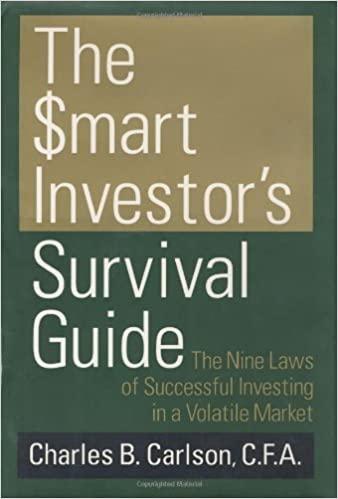Question
17. Your mortgage has 25 years left, and has an APR of 7.625% with monthly payments of $1449. a. What is the outstanding balance? b.
17. Your mortgage has 25 years left, and has an APR of 7.625% with monthly payments of $1449.
a. What is the outstanding balance?
b. Suppose you cannot make the mortgage payment and you are in danger of losing your
house to foreclosure. The bank has offered to renegotiate your loan. The bank expects to get
$150,000 for the house if it forecloses. They will lower your payment as long as they will
receive at least this amount (in present value terms). If current 25-year mortgage interest
rates have dropped to 5% (APR), what is the lowest monthly payment you could make for
the remaining life of your loan that would be attractive to the bank?
22. You need a new car and the dealer has offered you a price of $20,000, with the following payment
options: (a) pay cash and receive a $2000 rebate, or (b) pay a $5000 down payment and
finance the rest with a 0% APR loan over 30 months. But having just quit your job and started
an MBA program, you are in debt and you expect to be in debt for at least the next 21%u20442 years.
You plan to use credit cards to pay your expenses; luckily you have one with a low (fixed) rate of
15% APR (monthly). Which payment option is best for you?
28. Consider a project that requires an initial investment of $100,000 and will produce a single
cash flow of $150,000 in five years.
a. What is the NPV of this project if the five-year interest rate is 5% (EAR)?
b. What is the NPV of this project if the five-year interest rate is 10% (EAR)?
c. What is the highest five-year interest rate such that this project is still profitable?
37. Your best friend consults you for investment advice. You learn that his tax rate is 35%, and he
has the following current investments and debts:
%u25A0 A car loan with an outstanding balance of $5000 and a 4.8% APR (monthly compounding)
%u25A0 Credit cards with an outstanding balance of $10,000 and a 14.9% APR (monthly
compounding)
%u25A0 A regular savings account with a $30,000 balance, paying a 5.50% EAR
%u25A0 A money market savings account with a $100,000 balance, paying a 5.25% APR (daily
compounding)
%u25A0 A tax-deductible home equity loan with an outstanding balance of $25,000 and a 5.0%
APR (monthly compounding)
a. Which savings account pays a higher after-tax interest rate?
b. Should your friend use his savings to pay off any of his outstanding debts? Explain.
Step by Step Solution
There are 3 Steps involved in it
Step: 1

Get Instant Access to Expert-Tailored Solutions
See step-by-step solutions with expert insights and AI powered tools for academic success
Step: 2

Step: 3

Ace Your Homework with AI
Get the answers you need in no time with our AI-driven, step-by-step assistance
Get Started


